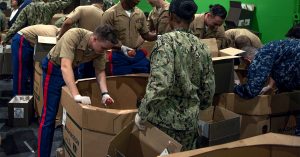Certain things can seem harder OCONUS. If you’ve ever put all your faith in a translating app as you shop the aisles of a grocery store in another country, trying to find the “regular” milk, you know what I’m talking about. Thankfully, the universe sends us curve balls to balance the scales. Things we assume will go from complicated to catastrophic when we add O to CONUS maintain the same familiar headaches that they bring stateside. I can’t believe I’m saying this — but filing your taxes OCONUS is very similar to filing in the states. If you’re feeling skeptical, like I once was, here are some answers to common questions that might help put your mind at ease.
- You won’t need any additional forms to file taxes OCONUS, unless you plan to apply for an extension.
- You must pay your tax bill by April 15. If April 15 falls on a weekend or legal holiday, you must pay your tax bill by the next business day. Otherwise you could face penalties and interest.
- An automatic two-month extension to file your taxes is available for all overseas taxpayers if you need it. To qualify, you must either live or be stationed outside the U.S. and Puerto Rico, or you must be on orders outside the U.S. and Puerto Rico for a period that includes the entire due date of the return. If you’re stationed OCONUS and living there, this applies to you. This extension does not require filing for an extension on IRS Form 4868.
- An additional four-month extension to file your taxes is available. To qualify, you must file IRS Form 4868 by June 15. (That’s the end of the automatic two-month filing extension.) This slides your extension to file to Oct. 15.
- The same tax “what-ifs” exist for military families OCONUS. If, for example, you sold your house last year when you PCS’d, you might wonder if you must include the profit in your return. The best resource I’ve found for all these what-ifs, or for general tax knowledge, is IRS Publication 3. Aside from the typical what-ifs civilians might also face, IRS Publication 3 (or the Armed Forces’ Tax Guide) gives special attention to the special tax considerations for military service members and families.
- OCONUS doesn’t automatically mean you are eligible for the combat zone tax exclusion. In most cases, if your entire family PCS’d to your OCONUS location, the service member is not deployed to a combat-zone designated area and is not able to exclude military pay and benefits from taxation.
- Moving expenses for service members can only be deducted if they were not reimbursed by the government. An example of an unreimbursed OCONUS moving expense is the shipment of your pet.
- You can use the Military OneSource tax-filing services OCONUS. MilTax software is accessible worldwide. You can also access the Military OneSource call center from your OCONUS location to speak with a tax rep, or you can find an OCONUS Volunteer Income Tax Assistance location near you.
 So, let’s cut to the chase. If you plan ahead to file by the regular deadline, and you take advantage of the Military OneSource tax consultants and MilTax, filing OCONUS should be painless — or at least no more painful than filing stateside. As you’re working through the forms, if anything pops up that makes you go, “Huh?” use your resources. That’s what they’re there for.
So, let’s cut to the chase. If you plan ahead to file by the regular deadline, and you take advantage of the Military OneSource tax consultants and MilTax, filing OCONUS should be painless — or at least no more painful than filing stateside. As you’re working through the forms, if anything pops up that makes you go, “Huh?” use your resources. That’s what they’re there for.





